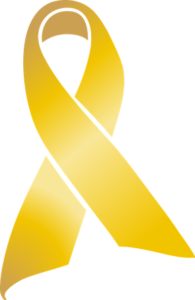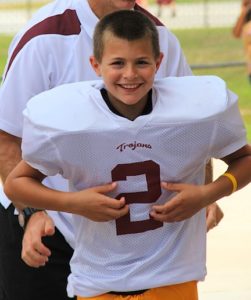Doctors’ Notes
BackChildhood Cancer Awareness
You probably know what a pink ribbon signifies, right? But what about a gold ribbon? Anyone?
 Frankly, I wouldn’t have known either, if my nephew hadn’t been diagnosed with Acute Lymphoblastic Leukemia at the age of 6 in 2008. The gold ribbon is the symbol for childhood cancer, a leading cause of death in kids under the age of 15.
Frankly, I wouldn’t have known either, if my nephew hadn’t been diagnosed with Acute Lymphoblastic Leukemia at the age of 6 in 2008. The gold ribbon is the symbol for childhood cancer, a leading cause of death in kids under the age of 15.
I can’t imagine many things more horrible than being told your child has cancer. Cancer. That’s supposed to be something old people get, or at least adults, right? Sadly, somewhere around 28 kids per day are diagnosed with cancer. Each day, 4 kids lose their battle with it. We’ve all heard of the most common adult cancers: breast, prostate, colon. The childhood cancers, thankfully more rare, are names you may not have heard: Neuroblastoma, Ewing’s Sarcoma, Wilm’s Tumor.
Besides honoring these heroes and their families, those who wear gold ribbons and try to raise awareness this month are doing it because only a very small amount of government funding actually trickles down to childhood cancer research. Our nation spends $5 billion on cancer research; only about 4% of that goes toward childhood cancers. Of course, this is not to say that research for other cancers shouldn’t get funding, just highlighting a good reason for designating an entire month to this cause. It’s why “cancer moms and dads” work tirelessly even after losing a child to cancer, or long after their child comes off treatment, to raise awareness and funds to study these diseases and find treatments and cures.
The good news is that the survival rate for childhood cancers is up around 80%, which means there are thousands of childhood cancer survivors alive today. Some of them are dealing with the long term effects of chemotherapy or radiation treatments, which can range from learning problems and post-traumatic stress disorder to growth failure, heart abnormalities, and even second cancers.
When my sister, hundreds of miles away, was going through a parent’s nightmare, we were too far away to stay with her other kids while she stayed in the hospital and traveled to clinic visits. Too far away to fill her freezer with food or sit with her son so she could get a break. I asked her what made a difference during those horrible months (years) of treatment. What would she advise a friend of someone going through a similar situation? So, here, in no particular order, is her “Top 5 Things You Can Do To Help A Cancer Family”
1. Keep germy kids away, and please vaccinate! What is to your child a “regular virus” could be deadly for a child with a suppressed immune system from cancer treatment. (This includes chickenpox, whooping cough— you name it!)
2. Always wash your hands! (And, I’ll add, don’t make fun of how much hand sanitizer your friend might be using; my sister is the QUEEN of hand sanitizer, for good reason!)
3. Organize meals. Just going ahead and doing it is more helpful than saying “please call me if you need anything.” Even reaching out is sometimes more than a cancer family can handle. Food is not likely to be refused, and can be frozen, so jump in and get a few friends together to stock their freezer.
4. Offer to watch siblings on clinic days. Children going through cancer have lots of appointments, and siblings sometimes aren’t even allowed to come. Giving them another option (and bonus: some extra attention for siblings also feeling the stress of this situation) is really helpful.
5. Don’t try to compare their experience with one of your own that is not the same (“my cat had cancer last year, and it was devastating”). It’s ok if you really don’t understand. It’s ok to even say that. (Ok, that one was my favorite. Somehow my sister is always able to make me laugh in the middle of tragedy. Her blog during treatment had us laughing and crying with each entry!)
 My brave, amazing nephew (pictured here, with permission) officially finished his treatment for leukemia in the summer of 2011. He is as healthy as the next kid and doesn’t miss a beat. Though obviously grateful for where they are right now, my sister still lives with anxiety about the future. Will he have side effects from the treatment some day? In a few years, he will be pronounced officially “cured,” and I’m sure there will be a big party then. In the meantime, we’ll keep spreading the word about these strong fighters and their families, who this month are working tirelessly to raise funds to fight a terrible disease.
My brave, amazing nephew (pictured here, with permission) officially finished his treatment for leukemia in the summer of 2011. He is as healthy as the next kid and doesn’t miss a beat. Though obviously grateful for where they are right now, my sister still lives with anxiety about the future. Will he have side effects from the treatment some day? In a few years, he will be pronounced officially “cured,” and I’m sure there will be a big party then. In the meantime, we’ll keep spreading the word about these strong fighters and their families, who this month are working tirelessly to raise funds to fight a terrible disease.
If you’re ever interested in donating to fight childhood cancers, there are lots of organizations you can turn to, including the American Childhood Cancer Organization and CURE Childhood Cancer.
Dr. Amy Maddalena, a Kids Plus Doc since 2006, teaches the Expectant Parent Orientation class at our Pleasant Hills office.